
Anchor Down: Tolbert Set 400H CR In 1997
There have been a few thousand national champions crowned over the near century-long span of the NCAA Division I Outdoor Track & Field Championships and a few dozen have set a collegiate record en route to an individual event title. But, how many of those performances led to an invitation to meet with a sitting Vice President of the United States?
Vanderbilt’s Ryan Tolbert earned that experience of a lifetime in 1997. Running the 400-meter hurdles in a collegiate record 54.54 for the NCAA title, Tolbert captured the first national crown (individual or team) in the history of Vanderbilt University.
Head coach Paul Arceneaux remarked, “Ryan was charging the whole way. Usually she just runs fast enough to win, but today she left no doubt. With three hurdles to go, you knew she was going to win. It’s a great feeling to know that she is the first Vanderbilt athlete to win an NCAA Championship.”
It was such a special occasion that Tolbert garnered the attention of then-Vice President of the United States Al Gore. He and his wife, Tipper, were going to visit the Chancellor of Vanderbilt, Joe B. Wyatt, in the next few days and asked if Tolbert could join them for dinner.
Originally from Clovis, New Mexico, Tolbert started her career as a heptathlete, but a fussy hamstring injury sidelined the all-around speciality. Her focus on the long-distance hurdles proved to be a good fit.
To wit: Tolbert also finished third in the 400 meters that year. To this date, she is only the third woman in meet history to win the 400H and earn a place in the non-hurdled one-lapper (Iowa State’s Nawal El Moutawakel was first in 1984; South Carolina’s Lashinda Demus followed in 2002).
The NCAA and collegiate track & field will mark a momentous milestone in the spring of 2021 -- the 100th anniversary of the NCAA Championships and with that, the NCAA Track & Field Championships. In June 1921, the University of Chicago hosted the first track & field championships in NCAA history.
This point can’t be emphasized enough: Not only was the event the first for NCAA track & field, but the first championships for any sport under the sponsorship of the NCAA.
To celebrate, over each of the next 365 days, the U.S. Track & Field and Cross Country Coaches Association (USTFCCCA) will celebrate moments, student-athletes, and coaches that have made a century’s worth of championships special. From humble beginnings to important historical milestones to the modern-day, collegiate track & field has evolved with the American society.
The 2021 edition of the NCAA Division I Outdoor Track & Field Championships begin with preliminary round action on May 27-29 in Jacksonville, Fla., and College Station, Texas. The championships final site and culmination of the celebration is slated for June 9-12, 2021 at the newly rebuilt Hayward Field in Eugene, Ore.
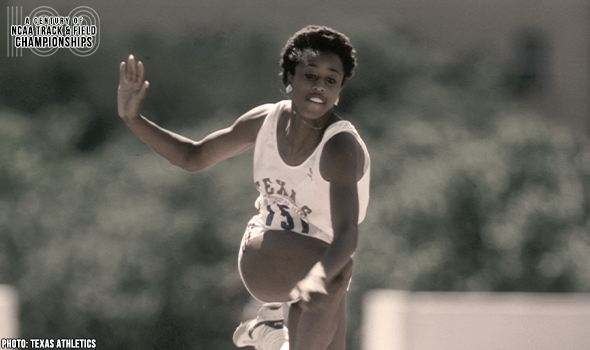
Texas’ Turner Soared To Triple Jump Greatness
Terri Turner was a two-time TJ champion at the NCAA DI Outdoor T&F Championships. When Turner won her 2nd title in 1986, she set an all-time world best of 13.66m (44-9¾).
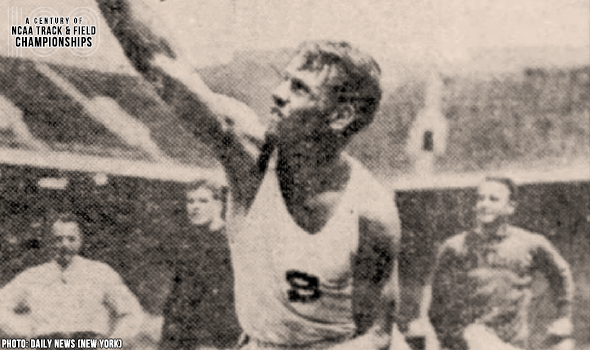
Stanford’s Rothert Starred In The Shot Put
Harlow Rothert won three consecutive shot put titles at the NCAA Outdoor T&F Championships between 1928 & 1930. He set meet records in both 1929 and 1930.

Indiana’s Kharun Set Javelin MR In 2003
Irina Kharun won the javelin title at the 2003 NCAA DI Outdoor T&F Championships with a meet record heave of 61.82m (202-10). It also helped her win by more than 30 feet!
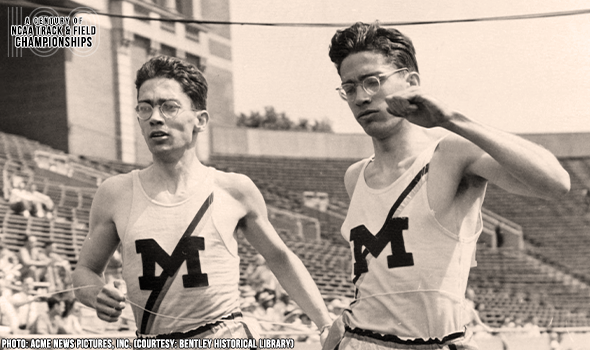
Hume Brothers Had Officials Seeing Double
Twins Robert & Ross Hume purposefully tied for the mile crown at the 1944 NCAA Outdoor Track & Field Championships. They tried again in 1945, but officials gave Ross the win.
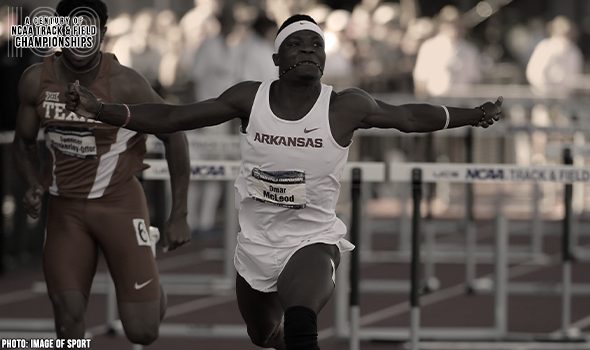
Woo Pig Sooie! McLeod Sizzled Track In 2015!
Omar McLeod clocked a sizzling 13.01 (+3.9) to win the 110HH at the 2015 NCAA DI Outdoor T&F Championships. Only one man had ever gone faster in meet history at the time.

Felicien Starred In The 100H At NCAAs
Perdita Felicien won back-to-back 100H titles at the NCAA Division I Outdoor T&F Championships in 2002 & 2003. She set a MR of 12.68 in the semifinals on the way to title No. 2.

Truly “Unbroken,” Zamperini Shined At NCAAs
Louis Zamperini set a meet record in the mile of 4:08.3 at the 1938 NCAA Outdoor T&F Championships. Zamperini, who also won the mile in 1939, saw his record last 15 years.
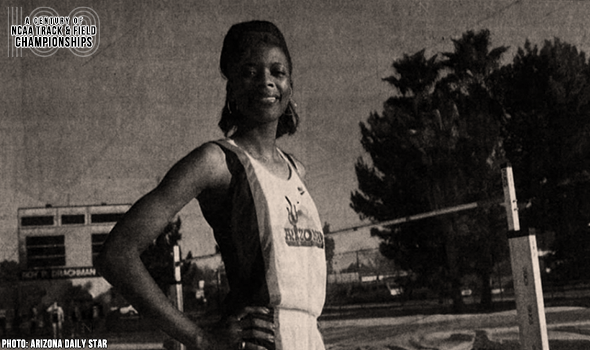
Hughes Soared To Three Consecutive HJ Titles
Tanya Hughes was the first woman to win three high jump titles at the NCAA Division I Outdoor T&F Championships. Hughes did so consecutively in 1991, 1992 & 1993.
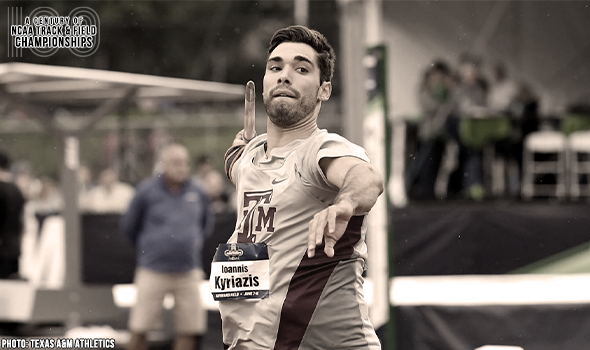
Kyriazis Made Point With Javelin In 2017
Ioannis Kyriazis set a meet record in the javelin of 82.58m (270-11) and won by more than 19 feet at the 2017 NCAA DI Outdoor T&F Championships.
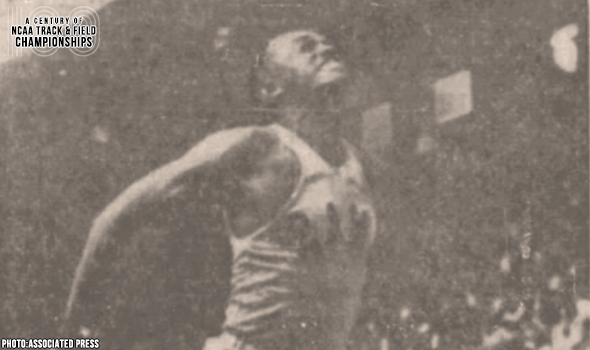
Sharpe Bounded To Meet History In 1956
Bill Sharpe became the first man to eclipse the 50-foot barrier in the triple jump at the NCAA DI Outdoor T&F Championships in 1956. Sharpe won with his 15.36m (50‑4¾) effort.

